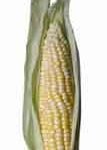I love marketing reframes. For years, one of my favorites was the pork industry’s, “Pork, the other white meat” campaign, which equated pork to chicken — only to run smack dab into the bird-flu scare. A quick reframe at that point gave us, “Pork, it’s not chicken,” only to run into the “Swine” flu epidemic, which led to, “Pork, the meat of kings.”
Well, let no one say the corn syrup industry plays second fiddle to the pork industry. The latest news about high fructose corn syrup (HFCS) comes from the “now I’ve heard everything” department. It seems that the sweetener has something of a public relations problem, as hard to believe as that might be. About 58 percent of Americans think that high fructose corn syrup poses health risks, according to research from NDP Group, not to mention HFCS sales figures over the last few years. And so, as you might have heard by now, the group that represents the manufacturers of HFCS, the Corn Refiners Association, has petitioned the FDA to start calling the stuff “corn sugar.”
Of course, the logical question is, “Huh?” It seems that the Corn Refiners Association believes that the name change will clear up consumer “confusion” about HFCS. According to Audrae Erickson, the group’s president, “Research shows that ‘corn sugar’ better communicates the amount of calories, the level of fructose and the sweetness in this ingredient.” She went on to say, “The name is confusing, and consumers don’t understand that it has the same calories as sugar. They also think it’s sweeter tasting. That’s why the alternate name provides clarity for consumers when it comes to the ingredient composition and helps them better understand what’s in their foods.”
While the studies surrounding HFCS present a confusing array of claims, any consumer confusion is the result, not of bad press, but of deliberate attempts by those with a large financial stake in HFCS to confound consumers over the years. The whole controversy started with a study published in 2004 by researchers from the Pennington Biomedical Research Center of Louisiana State University. Their research linked the use of HFCS in beverages to the obesity epidemic in the U.S. According to these scientists, the increased use of HFCS in the U.S. from 1970-1990 mirrored the rapid increase in obesity. According to the abstract of the study, “…the increase in consumption of HFCS has a temporal relation to the epidemic of obesity, and the over-consumption of HFCS in calorically sweetened beverages may play a role in the epidemic of obesity.”
Of course, the HFCS manufacturers were not going to take this lying down. As negative press spread, they fired back with a specious ad campaign in 2008 and created the Sweet Surprise website to “debunk” the claims about HFCS. They also funded a number of studies. According to a report by CBS News, “Of the six studies CBS News looked at on the association’s website that “Confirm High Fructose Corn Syrup [is] No Different From Sugar,” three were sponsored by groups that stand to profit from research that promotes HFCS. Two were never published, so their funding sources are unclear. And one was sponsored by a Dutch foundation that represents the interests of the sugar industry.”
It seems that the efforts of the Corn Refiners Association have paid off. Scientists and medical practitioners seem to buy the argument that HFCS is not nutritionally different from cane or beet sugar. For example, according to an article in the New York Times, “The American Dietetic Association says the two sweeteners are “nutritionally equivalent” and “indistinguishable” once absorbed in the bloodstream. The American Medical Association has said, it’s “unlikely that HFCS contributes more to obesity or other conditions than sucrose.”
On the other hand, studies early last year at Princeton University found that rats gained considerably more weight when they consumed high fructose corn syrup compared to rats who ate basic table sugar, although both group had the same total caloric intake. In fact, the rats eating the HFCS gained 48 percent more weight than those consuming an equivalent amount of regular table sugar, plus, they had a far higher incidence of metabolic syndrome. Dang those rats! They were immune to advertising and reframing!
In September 2009, I did a thorough analysis of the merits — or lack thereof — of HFCS in my newsletter, “High Fructose Corn Syrup, Oh Boy!” Here are the essentials. While it’s true that HFCS is made from corn, the claims that it’s perfectly safe and natural may be a stretch. For example, bio-diesel is also made from corn, but you wouldn’t want to eat it. Castor oil, which is considered safe for use as a laxative is the source of one of the most deadly poisons known to man, ricin. So the source is no guarantee of the safety of the product. Plus, the fact that the chemical bonds in HFCS are broken and rearranged in the manufacturing process (something that doesn’t happen in the refining of sugar) is a sure sign that the product is not natural.
Then there is the calorie count. Both sugar and HFCS contain about 15 calories per teaspoon, and even if they affected the body in the same way (which the Princeton study indicates is notthe case), what matters is how those calories mount up. A 12-ounce serving of fruit punch or soda contains about one teaspoon of sweetener per ounce. That’s 12 teaspoons, or about 150 calories per serving. Drink several of those a day and you’ve added 300 extra empty calories per day to your diet. At three to six servings per day, that could translate to an added two pounds of body weight gained each and every week. Youch! In short, the similarity in calories is nothing to be proud of.
But let’s put aside the pathetic efforts of industry to resurrect a cheap and potentially harmful ingredient for a moment, because an even more pressing issue is the continuing love affair Americans have with sweets. According to the New York Times, “Today, sugar calories account for 16 percent of the calories Americans consume, a 50 percent increase from the 1970s.”
As I’ve written before, Americans are way over the threshold for healthy sugar consumption. Whatever name the Corn Refiners Association wants to use for HFCS, the fact remains that it significantly contributes to the dangerous and unhealthy levels of sugar, of any kind, consumed by the American public.
:hc












Aside from the fact that Corn
Aside from the fact that Corn Syrup is a shocking product. The devastation to the forests that allows this industry to grow has to be seen to be believed. On a recent trip to Kuala Lumpur, I was horrified to see the destruction it has caused. From the air, as far as the eye can see, all the forest has been chopped down and all you can see is palm trees. This of course all affects the wild life and hopefully people know that Orangutan and other species that now have no natural habitat. It is very sad and I don’t know how it has been allowed to happen.
Poison by any other name is
Poison by any other name is still poison!!!!!
Excellent article!. It proves
Excellent article!. It proves once more that manufactured foods, which breaks the chemical bonds deals with an increase of the glycemic index. In the glycemic index table, corn syrup has the highest rate.